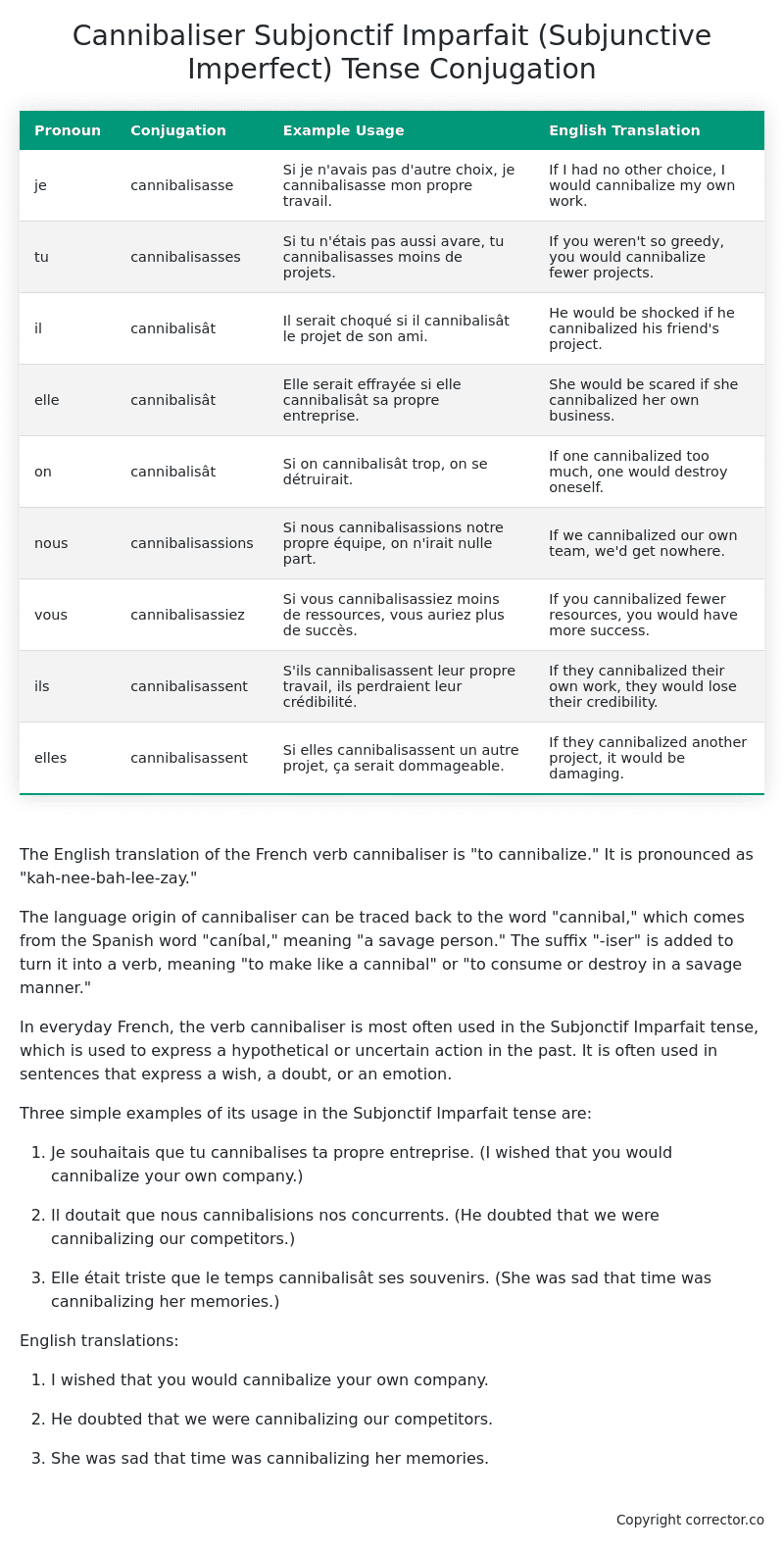Subjonctif Imparfait (Subjunctive Imperfect) Tense Conjugation of the French Verb cannibaliser
Introduction to the verb cannibaliser
The English translation of the French verb cannibaliser is “to cannibalize.” It is pronounced as “kah-nee-bah-lee-zay.”
The language origin of cannibaliser can be traced back to the word “cannibal,” which comes from the Spanish word “caníbal,” meaning “a savage person.” The suffix “-iser” is added to turn it into a verb, meaning “to make like a cannibal” or “to consume or destroy in a savage manner.”
In everyday French, the verb cannibaliser is most often used in the Subjonctif Imparfait tense, which is used to express a hypothetical or uncertain action in the past. It is often used in sentences that express a wish, a doubt, or an emotion.
Three simple examples of its usage in the Subjonctif Imparfait tense are:
-
Je souhaitais que tu cannibalises ta propre entreprise. (I wished that you would cannibalize your own company.)
-
Il doutait que nous cannibalisions nos concurrents. (He doubted that we were cannibalizing our competitors.)
-
Elle était triste que le temps cannibalisât ses souvenirs. (She was sad that time was cannibalizing her memories.)
English translations:
-
I wished that you would cannibalize your own company.
-
He doubted that we were cannibalizing our competitors.
-
She was sad that time was cannibalizing her memories.
Table of the Subjonctif Imparfait (Subjunctive Imperfect) Tense Conjugation of cannibaliser
| Pronoun | Conjugation | Example Usage | English Translation |
|---|---|---|---|
| je | cannibalisasse | Si je n’avais pas d’autre choix, je cannibalisasse mon propre travail. | If I had no other choice, I would cannibalize my own work. |
| tu | cannibalisasses | Si tu n’étais pas aussi avare, tu cannibalisasses moins de projets. | If you weren’t so greedy, you would cannibalize fewer projects. |
| il | cannibalisât | Il serait choqué si il cannibalisât le projet de son ami. | He would be shocked if he cannibalized his friend’s project. |
| elle | cannibalisât | Elle serait effrayée si elle cannibalisât sa propre entreprise. | She would be scared if she cannibalized her own business. |
| on | cannibalisât | Si on cannibalisât trop, on se détruirait. | If one cannibalized too much, one would destroy oneself. |
| nous | cannibalisassions | Si nous cannibalisassions notre propre équipe, on n’irait nulle part. | If we cannibalized our own team, we’d get nowhere. |
| vous | cannibalisassiez | Si vous cannibalisassiez moins de ressources, vous auriez plus de succès. | If you cannibalized fewer resources, you would have more success. |
| ils | cannibalisassent | S’ils cannibalisassent leur propre travail, ils perdraient leur crédibilité. | If they cannibalized their own work, they would lose their credibility. |
| elles | cannibalisassent | Si elles cannibalisassent un autre projet, ça serait dommageable. | If they cannibalized another project, it would be damaging. |
Other Conjugations for Cannibaliser.
Le Present (Present Tense) Conjugation of the French Verb cannibaliser
Imparfait (Imperfect) Tense Conjugation of the French Verb cannibaliser
Passé Simple (Simple Past) Tense Conjugation of the French Verb cannibaliser
Passé Composé (Present Perfect) Tense Conjugation of the French Verb cannibaliser
Futur Simple (Simple Future) Tense Conjugation of the French Verb cannibaliser
Futur Proche (Near Future) Tense Conjugation of the French Verb cannibaliser
Plus-que-parfait (Pluperfect) Tense Conjugation of the French Verb cannibaliser
Passé Antérieur (Past Anterior) Tense Conjugation of the French Verb cannibaliser
Futur Antérieur (Future Anterior) Tense Conjugation of the French Verb cannibaliser
Subjonctif Présent (Subjunctive Present) Tense Conjugation of the French Verb cannibaliser
Subjonctif Passé (Subjunctive Past) Tense Conjugation of the French Verb cannibaliser
Subjonctif Imparfait (Subjunctive Imperfect) Tense Conjugation of the French Verb cannibaliser (this article)
Conditionnel Présent (Conditional Present) Tense Conjugation of the French Verb cannibaliser
Conditionnel Passé (Conditional Past) Tense Conjugation of the French Verb cannibaliser
L’impératif Présent (Imperative Present) Tense Conjugation of the French Verb cannibaliser
L’infinitif Présent (Infinitive Present) Tense Conjugation of the French Verb cannibaliser
Struggling with French verbs or the language in general? Why not use our free French Grammar Checker – no registration required!
Get a FREE Download Study Sheet of this Conjugation 🔥
Simply right click the image below, click “save image” and get your free reference for the cannibaliser Subjonctif Imparfait tense conjugation!

Cannibaliser – About the French Subjonctif Imparfait (Subjunctive Imperfect) Tense
Formation
Common Everyday Usage Patterns
Interactions with Other Tenses
Subjonctif Présent
Indicatif Passé Composé
Conditional
Conditional Perfect
Summary
I hope you enjoyed this article on the verb cannibaliser. Still in a learning mood? Check out another TOTALLY random French verb conjugation!


